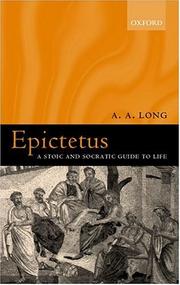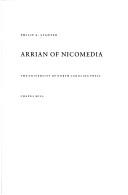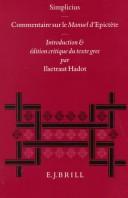| Listing 1 - 7 of 7 |
Sort by
|

ISBN: 0199245568 0191597929 0199268851 9786611944155 1281944157 0191529710 9780199268856 9780199245567 Year: 2002 Publisher: Oxford Clarendon
Abstract | Keywords | Export | Availability | Bookmark
 Loading...
Loading...Choose an application
- Reference Manager
- EndNote
- RefWorks (Direct export to RefWorks)
Epictetus --- Stoics. --- Stoïcisme --- Epictetus. --- Ėpiktet --- Epiktit --- Epitteto --- Epiktétos --- Epictète --- Epicteto --- Ἐπίκτητος --- Epiktetos --- Stoïcisme --- Epiktet

ISBN: 9004057706 9004320555 9789004057708 Year: 1978 Volume: 34 Publisher: Leiden : E.J. Brill,
Abstract | Keywords | Export | Availability | Bookmark
 Loading...
Loading...Choose an application
- Reference Manager
- EndNote
- RefWorks (Direct export to RefWorks)
Cynicism --- Stoics --- Epictetus --- Ethics --- Philosophy, Ancient --- Pessimism --- Philosophy --- Psychology --- Skepticism --- Ėpiktet --- Epiktit --- Epitteto --- Epiktétos --- Epictète --- Epicteto --- Ἐπίκτητος --- Cynicism. --- Stoics. --- Epictetus. --- Epiktetos --- Epiktet --- About cynism (Epictetus) --- Vom Kynismus (Epictetus) --- Peri kynismou (Epictetus) --- Epictetus - About cynism

ISBN: 0807813648 Year: 1980 Publisher: Chapel Hill University of North Carolina press
Abstract | Keywords | Export | Availability | Bookmark
 Loading...
Loading...Choose an application
- Reference Manager
- EndNote
- RefWorks (Direct export to RefWorks)
Epictetus. --- Arrian. --- Arrian --- Epictetus --- Ėpiktet --- Epiktit --- Epitteto --- Epiktétos --- Epictète --- Epicteto --- Ἐπίκτητος --- Arrianus, Flavius --- Arrien --- Arriános --- Arriano, Flavio --- Arriano, Lucio Flavio --- Arriano --- Arrian, Flaviĭ --- Αρριανός --- Epiktetos --- Epiktet --- Arrianus Historicus --- Arrianus Nicomediensis --- Arrianus
Book
ISBN: 0429906773 0429482000 1280686138 9786613663078 1849409927 9781849409926 9781280686139 9781780490236 1780490232 0429921004 Year: 2012 Publisher: London Karnac Books
Abstract | Keywords | Export | Availability | Bookmark
 Loading...
Loading...Choose an application
- Reference Manager
- EndNote
- RefWorks (Direct export to RefWorks)
This book brings together the papers written by the authors over the last fifteen years on the historical and philosophical foundations of Albert Ellis' Rational Psychotherapy (later Rational Emotive Behavior Therapy, REBT) and its relationship to Stoicism, especially the later practical form represented by Epictetus. It goes beneath the well known similarities between Stoic "spiritual exercises" and modern psychotherapy, to look at the cause of these similarities. These lie in the conceptual continuities that connect the Stoics and other ancient philosophies with the modern cultural framework underlying psychotherapy.
Rational emotive behavior therapy. --- Rational-emotive psychotherapy --- Rational emotive therapy --- Rational psychotherapy --- REBT (Rational emotive behavior therapy) --- RET (Rational emotive therapy) --- Cognitive therapy --- Epictetus. --- Epictetus --- Epiktetos --- Epiktet --- Ėpiktet --- Epiktit --- Epitteto --- Epiktétos --- Epictète --- Epicteto --- Ἐπίκτητος

ISBN: 9004097724 9004320881 9789004097728 Year: 1996 Volume: 66 Publisher: Leiden : Brill,
Abstract | Keywords | Export | Availability | Bookmark
 Loading...
Loading...Choose an application
- Reference Manager
- EndNote
- RefWorks (Direct export to RefWorks)
The significance of Simplicius' commentary lies in the fact that it is a Neoplatonist interpretation of a Stoic text. This volume presents the first critical edition based on all the known manuscripts of this work and offers, in contrast to the edition of Schweighäuser (1800) and the recapitulation of this edition by Dübner (1840), a text which is more complete and improved. A long introduction places the work in the philosophical and historical context of its time and characterises it as a spiritual exercise. The edition is preceded by a summary of the history of the text.
Ethics --- Conduct of life --- Morale --- Morale pratique --- Early works to 1800 --- Ouvrages avant 1800 --- Epictetus --- Ethics, Ancient. --- -Ethics, Ancient --- Ancient ethics --- Ethics, Practical --- Morals --- Personal conduct --- Philosophical counseling --- Ėpiktet --- Epiktit --- Epitteto --- Epiktétos --- Epictète --- Epicteto --- Ἐπίκτητος --- Early works to 1800. --- Epiktetos --- Epiktet --- Ethics, Ancient --- Epictetus. --- Conduct of life. --- Manual (Epictetus) --- Enchiridion (Epictetus) --- Encheiridion (Epictetus) --- Conduct of life - Early works to 1800.
Book
ISBN: 9783110843774 3110843773 Year: 1964 Volume: 10. Bd. Publisher: Berlin : Alfred Topelmann Verlag,
Abstract | Keywords | Export | Availability | Bookmark
 Loading...
Loading...Choose an application
- Reference Manager
- EndNote
- RefWorks (Direct export to RefWorks)
Keine ausführliche Beschreibung für "Epiktet und das Neue Testament" verfügbar.
HISTORY / Ancient / General. --- Epictetus. --- Epictetus --- Epiktetos --- Epiktet --- Bible. --- Ba-yon Tipan --- Bagong Tipan --- Jaji ma Hungi --- Kainē Diathēkē --- New Testament --- Nouveau Testament --- Novo Testamento --- Novum Testamentum --- Novyĭ Zavet --- Novyĭ Zavi︠e︡t Gospoda nashego Īisusa Khrista --- Novyĭ Zavit --- Nuevo Testamento --- Nuovo Testamento --- Nye Testamente --- Perjanjian Baru --- Dhamma sacʻ kyamʻʺ --- Injīl --- Criticism, interpretation, etc. --- History --- Ėpiktet --- Epiktit --- Epitteto --- Epiktétos --- Epictète --- Epicteto --- Ἐπίκτητος

ISBN: 9004108289 9004321004 9789004108288 9789004321007 Year: 1997 Volume: 75 Publisher: Leiden Brill
Abstract | Keywords | Export | Availability | Bookmark
 Loading...
Loading...Choose an application
- Reference Manager
- EndNote
- RefWorks (Direct export to RefWorks)
The main argument of this book, against a prevailing orthodoxy, is that the study of logic was a vital - and a popular - part of stoic philosophy in the early imperial period. The argument relies primarily on detailed analyses of certain texts in the Discourses of Epictetus. It includes some account of logical 'analysis', of 'hypothetical' reasoning, and of 'changing' arguments. Written both for historians and for philosophers, and presupposing no logical expertise, this is an important contribution to the history of philosophy in the early imperial period.
Logic, Ancient --- Stoics --- Logique ancienne --- Stoïcisme --- Epictetus --- Marcus Aurelius, --- Seneca, Lucius Annaeus, --- Contributions in logic --- Logic, Ancient. --- Stoics. --- Ethics --- Philosophy, Ancient --- Ancient logic --- -Marcus Aurelius Emperor of Rome --- -Seneca, Lucius Annaeus --- -Ėpiktet --- Epiktit --- Epitteto --- Epiktétos --- Epictète --- Epicteto --- Ἐπίκτητος --- -Contributions in logic --- Seneca, Lucius Annaeus --- Sénèque --- Epiktetos --- Stoïcisme --- Epictetus. --- Aurelius Antoninus, Marcus, --- Aurelius, Marcus, --- Mark Aurel, --- Marcus Aurelius Antoninus, --- Mark Avreliĭ, --- Marek Aureliusz, --- Marc Aurel, --- Marcus Antoninus, --- Antoninus, Marcus, --- Markos Antōninos, --- Marco Aurelio, --- Marḳus Aʼurelyus, --- Marḳus Orelyus, --- Marks Aurēlijs, --- מארקוס אורליוס --- מרקוס אורליוס --- מרקוס אורליוס, --- Μάρκος Ἀντωνῖνος, --- Ἀντωνῖνος, Μάρκος, --- Epiktet --- Seneca --- Annaeus Seneca, Lucius, --- Seneca, Annaeus, --- Seneca, --- Seneca, L. A. --- Seneca, Lucio Anneo, --- Seneka, --- Seneka, L. Annėĭ, --- Sénèque, --- סנקא, לוציוס אנאוס --- Pseudo-Seneca --- Contributions in logic. --- Ėpiktet --- Marcus Aurelius Antoninus --- Seneka, L. Ann�e�i, --- S�en�eque, --- Marcus Aurelius
| Listing 1 - 7 of 7 |
Sort by
|

 Search
Search Feedback
Feedback About UniCat
About UniCat  Help
Help News
News